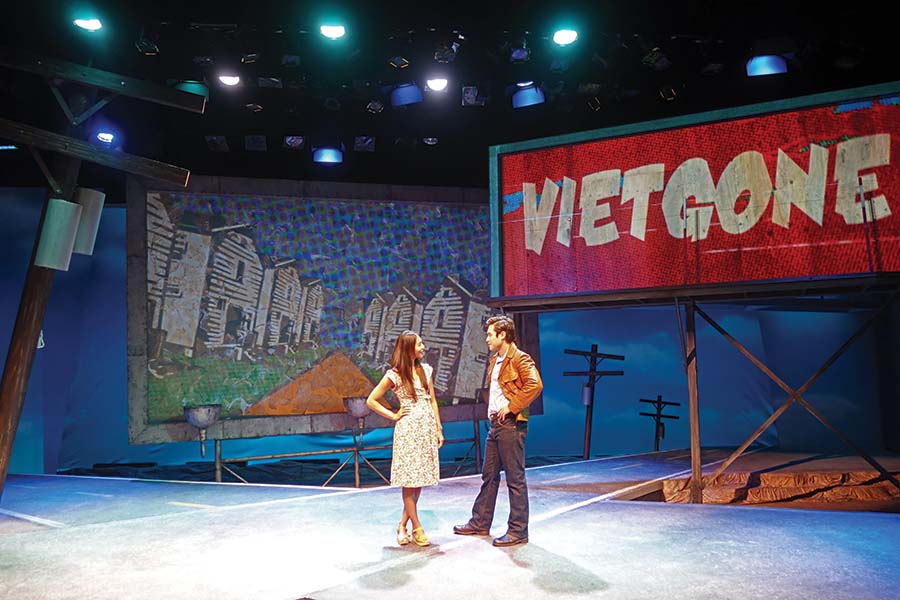It’s like the start of an ’80s romcom: When Qui Nguyen and May Adrales first met, they couldn’t stand each other. She was a director fresh out of grad school, he was a young playwright/fight director on the rise; they were both high-strung twentysomethings who took themselves way too seriously. After being hired to choreograph a fight for her that she had already “directed in her head,” resulting in more than a few toes being stepped on, Nguyen swore, “I’ll never work with her again.” Fast-forward a handful of years later, both of them a little older and a lot less serious; they’re now an inseparable artistic duo completely enamored with the other’s playful theatrical style. Here the playwright and director, who’ve so far staged Vietgone in four separate productions, discuss their work.
The full playscript of Vietgone appears in print in the February 2017 issue of American Theatre.
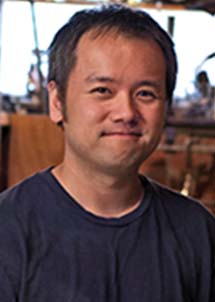
MAY ADRALES: Can you talk about why you wanted to tell this story and why it came out at this particular time in your life?
QUI NGUYEN: I’ve always wanted to tell my family’s stories. However, my first attempt at doing so was absolutely horrendous. Seriously, it was complete dog shit. It was a play called Trial by Water, which I wrote in grad school. I had never written a play before, so I had no voice as a writer; all I could do was imitate scribes that I liked. At that time, the writer that influenced me the most was David Henry Hwang. I imitated him the best I could, wrote the play, and surprisingly it was produced Off-Broadway a few years after I graduated. When my family finally got to see it, I looked over at my mom proudly and asked, “So what’d you think?” She responded bluntly, “It doesn’t sound like you.” I was shocked. “What do you mean it doesn’t sound like me? You’ve never read anything I’ve ever written.” I thought she was referring to my voice as a writer. What she meant was, literally, it didn’t sound like her son. She told me, “You’re mischievous and you’re funny and you like to goof around, and this play doesn’t show any of that.” My response to her was a very mature, “Screw you, Mom. If you really want to see me be all those things, I’ll write those things, and I’ll show you how much you won’t like it.”
And so I started this theatre company called Vampire Cowboys with director Robert Ross Parker and producer Abby Marcus that became the incubator for all my rebellious, mischievous ideas. We pioneered our own style of shows, lovingly dubbed “geek theatre,” by creating pop-culture-infused action-adventure stories with heroes who were female, people of color, and/or LGBTQ. We gave out beers, we bent genres, we featured a gratuitous amount of spectacle and songs and fights and profane animated short films at every performance. It was all super fun—a theatrical party—and all very “me,” and none of it resembled anything like that first play that my mother criticized. I knew I’d get back to writing those family stories one day, but I thought, “I’ll wait until I get much older and finally be mature enough to tackle those stories correctly.” And so I kept making my downtown shows and people kept selling them out, and at some point the big theatres like South Coast Rep took notice.
It’s now been nearly a decade and a half since we started Vampire Cowboys; I now have kids and my parents are getting older. I’m realizing that I’m never going to magically grow into that fictional writer in my head. I’m never going to be that “mature.” All I can be is me. And with that in mind, I thought, “Okay, fuck it. I’m going to write my parents’ story, but I’m going to be all those things my mom told me I should be, which is just myself.”
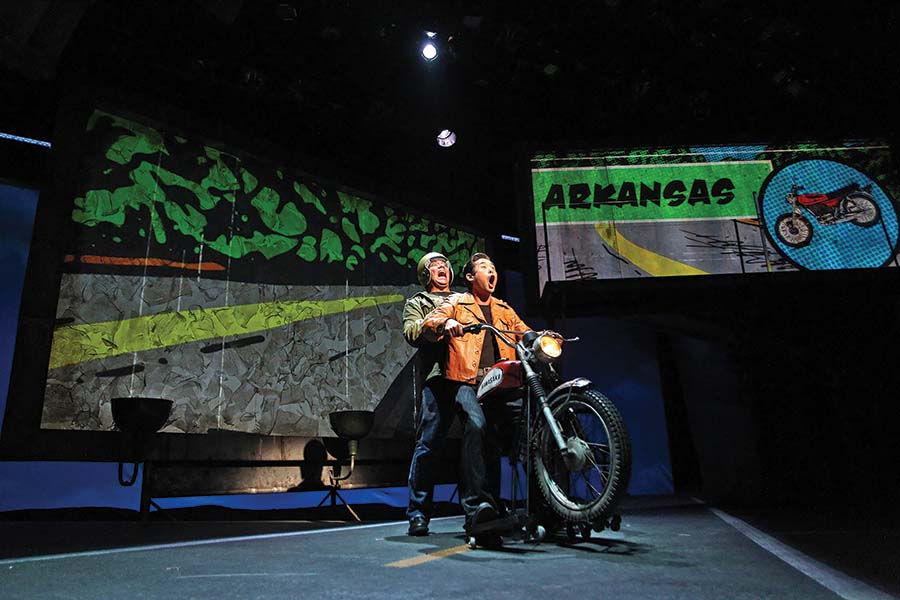
When you look at your theatre—and the kind of theatre that you want to see onstage—you often refer to it as family. And you create that family atmosphere so that you can create a creative environment in which people are arguing or just playing around with each other, just as family does. Can you talk about why that is?
For me in particular, it’s because—and my wife will completely disagree with this—I think of myself as a really shy introvert. Even though I enjoy public speaking and entertaining people and whatever, when it comes to actually being vulnerable, it’s hard for me. I’m so much more comfortable making a joke than being real. And so when I’m writing something like Vietgone, where we’re going to dive into my fears and skeletons in my family’s closet, I want to know that my team is filled with people that will go to the wall with me. If you look at my production history, you’ll notice I work with a select group of people over and over again, because I know that when I get in that rehearsal room, I’m gonna bare my soul. So when I meet people that I care about and trust implicitly, I hang onto them. This is my “family.” The advantage is that when you’re in a room with people you know have your back, you’re fearless—you can push the envelope way farther because you’re willing to experiment in ways you can’t when you don’t know each other very well and still trying to be polite. With the Vietgone fam and with Vampire Cowboys, we can both play and push each other beyond our limits. I don’t dream about celebrities; I dream about bringing my people up the mountain with me. That’s how I make my theatre. By the way, just to be clear, the person who did the most pushing in the Vietgone room was always May Adrales. She’s tiny, but mighty.
It’s more like whip-cracking.
Well, you do like to refer to yourself as “Tiger May.”
That is true. We do have our own little roles as a family.
We do.
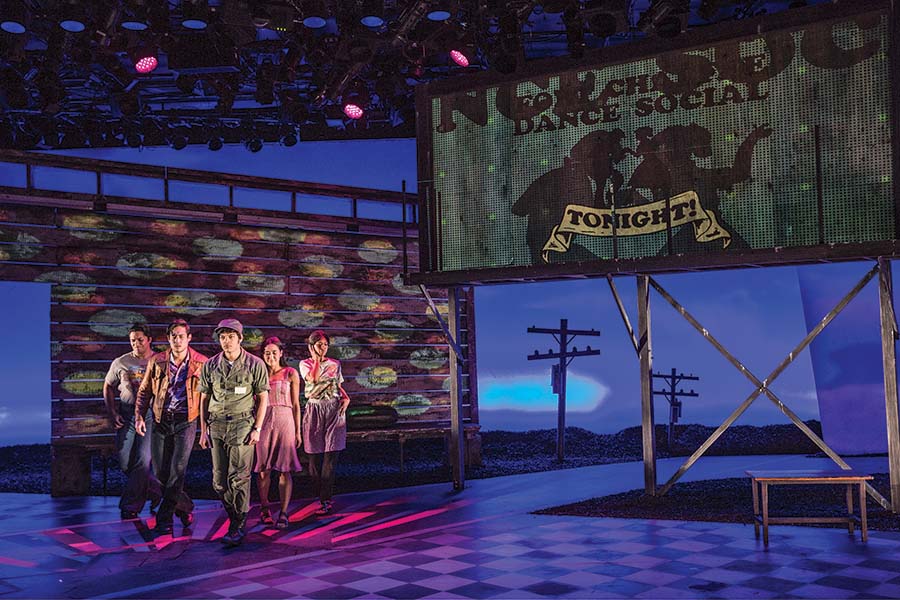
That’s what makes the work that we do together really uninhibited—because we don’t have to be polite.
Part of that also goes toward how you and I both feel about the whole “model minority” stereotype thing. So often when you’re Asian, that’s the glass ceiling. So much of what we’re trying to do as artists is break through that and to go beyond the expectations people have of us. When it comes to Asian-American people—not just as performers or artists—we often get portrayed and seen in a certain way. We’re encouraged by the world around us that we’re supposed to be studious and polite. But to break through barriers, it takes more than study and manners, it also takes assertiveness—demanding to be seen differently, demanding new roles to be seen in, demanding that these stories are ours. That’s what’s so great about doing work together with Vietgone and with Vampire Cowboys. We get to do what we want without asking. We just go there. Fuck manners.
Thus Vietgone is basically the anti-Miss Saigon. I don’t mean that it’s contradictory to the musical or even a reaction to it, but it’s about the Asian-American characters being the ones with agency over the narrative. They’re not a prop for the typical straight-white-male lead to learn from or to save. It’s not their story. It’s our story. We get to be the heroes.
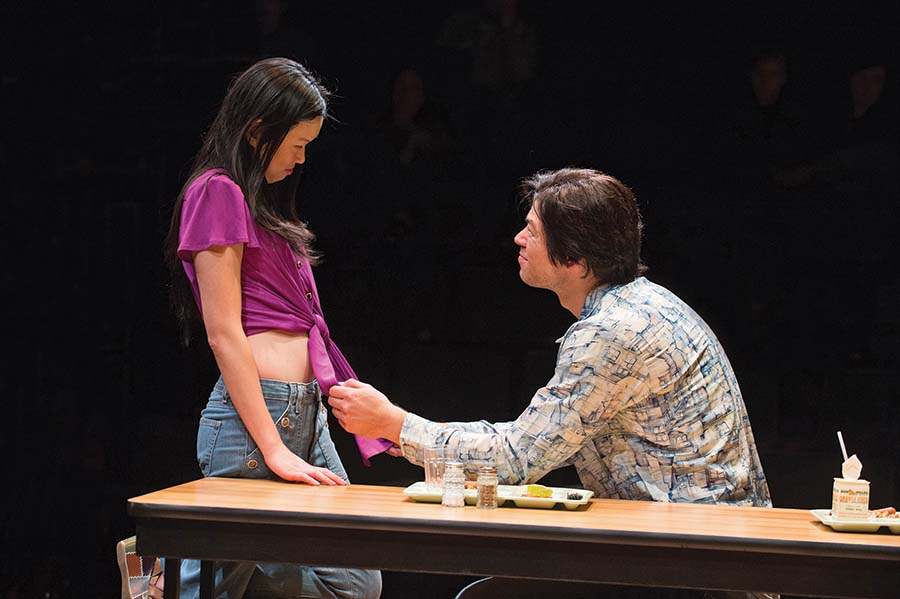
I’m sure you’ve gotten feedback from young people of color talking to you about how they’ve never seen anything like this. You’re making such a huge impact on a generation of theatregoers. How has that affected you?
Everyone deserves a chance to see themselves onstage. With Vietgone, I wanted to address the huge lack of sexually powerful, driven, and complex Asian-American male and female characters on our stages. I wanted to see a sexy Asian male and a sexy Asian female be sexy for something other than being “exotic.” And I wanted to make something that a young “yella” kid could see and feel proud of themselves after seeing it. In response, I remember a specific email I received during the South Coast Rep run of Vietgone from someone who wrote, “As an Asian-American kid, it feels like the world keeps telling me that I’m supposed to be weak. But when I saw Vietgone, it made me feel strong.” That’s the heartbeat of why I do what I do.
I’ve also gotten great emails from Vietnam War vets who never thought they would ever be recognized positively for their service. I think that Vietgone has tapped into way more people than I thought it would. I don’t think that changes what I want to make as an artist, but it does make me stop and realize that beyond all my jokes, maybe my plays make more impact than I ever thought they would.
One of the other things that has really come up is just how strong Tong is—how you create these really strong female leads that are sexually powerful. They’re not fetishized for being Asian, but they’re like amazingly, complex, strong women. I feel like, from what I know about your family, your mom is a big influence on that.
Oh yeah, I’m a total mama’s boy. When I hear stories about my mother’s fortitude, about the shit that she’s gone through, it always gives me perspective. I’m like, “Oh, I had a shitty day today because I couldn’t finish my draft.” And my parents are like, “Well, our shitty day at your age was we lost our entire country and everyone we knew.” My mom’s 4’11”, she’s pretty, and her English isn’t great, so people don’t expect much from her. But when I think of stuff like in 1988, when my mom’s brother and his family died trying to escape Vietnam, leaving their youngest son stranded alone in a refugee camp in the Philippines, I remember how hard she fought to bring him to America. When she was told that process would take years due to all sorts of red tape and bureaucracy, I witnessed her transform from my cute mom into an unstoppable force. She contacted our governor. She contacted our senator. She contacted the press and turned her quest for her nephew into the feel-good story of Arkansas in 1988 when she finally brought him over to America a few days before Thanksgiving of that year. What she was told would take at least two years to process ended up taking only two months because of her tenacity. Though she’s small, she’s incredibly strong. Whenever I sit down to write a female character, I’m always writing some version of her or my grandmother; that’s why all my female characters end up being badasses.

